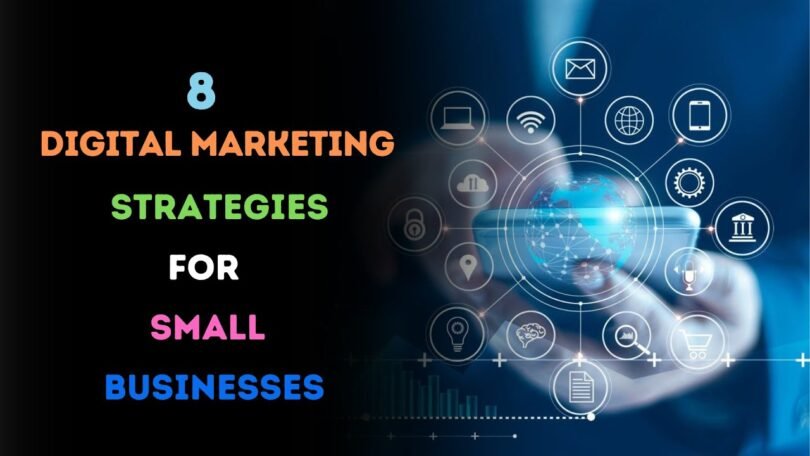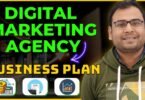Online Marketing Strategy
The online world is vast, dynamic, and constantly evolving. Whether you’re a small business owner or part of a large corporation, having a well-defined online marketing strategy is essential for success. Online marketing helps businesses reach their target audience, drive conversions, and stay competitive in today’s digital landscape. In this article, we’ll break down everything you need to know about creating an effective online marketing strategy and how to implement it.
What is Online Marketing?
Online marketing, also known as digital marketing, refers to the strategies and tactics used to promote products or services via the internet. This includes using search engines, social media platforms, email, and websites to connect with potential customers. Essentially, it’s all about being where your audience is – online.
Why Businesses Need a Strong Online Marketing Strategy
Without a well-thought-out strategy, your online marketing efforts can become scattered and ineffective. A solid strategy ensures that your business focuses on the right marketing channels, delivers a consistent message, and reaches the intended audience. It also allows you to track and measure success, making it easier to refine and improve your efforts over time.
Understanding the Core Components of an Online Marketing Strategy
SEO (Search Engine Optimization)
SEO is the backbone of online marketing. It involves optimizing your website and content to rank higher in search engine results. When done right, SEO can help drive organic traffic to your website, increase brand visibility, and improve credibility.
Content Marketing
Content marketing focuses on creating and sharing valuable, relevant content to attract and engage your audience. It includes blog posts, videos, infographics, and other types of media that provide value to your audience.
Social Media Marketing
With billions of people using social media platforms like Facebook, Instagram, and Twitter, social media marketing is a powerful way to connect with your audience. It can help build brand awareness, foster community, and generate leads through both organic content and paid advertising.
Email Marketing
Email marketing remains one of the most effective ways to engage customers and drive conversions. Through well-crafted email campaigns, businesses can nurture leads, build customer loyalty, and promote new products or services.
PPC (Pay-Per-Click) Advertising
PPC advertising involves paying for ad placements on search engines or social media platforms. These ads appear based on the keywords or audience targeting you choose, and you only pay when someone clicks on your ad. PPC can generate immediate traffic and leads, making it an essential part of many online marketing strategies.
How to Develop an Effective Online Marketing Strategy
Defining Your Business Goals
Before diving into tactics, it’s crucial to define your business goals. Are you trying to increase brand awareness, generate leads, or drive online sales? Having clear objectives will help you tailor your online marketing efforts to meet those goals.
Understanding Your Target Audience
Knowing your audience is key to developing an effective strategy. Conduct market research to identify your target audience’s demographics, behaviors, and preferences. The better you understand your audience, the more tailored and effective your marketing will be.
Competitor Analysis
Take a close look at your competitors to understand their strengths and weaknesses. By analyzing their marketing strategies, you can identify opportunities to differentiate your business and improve your online presence.
Selecting the Right Marketing Channels
Not all marketing channels are created equal. Depending on your business, certain channels may work better than others. For example, an e-commerce business might benefit more from SEO and social media ads, while a B2B company may see more success with content marketing and LinkedIn outreach.
The Importance of SEO in Online Marketing
SEO is crucial for driving organic traffic to your website. It involves optimizing various aspects of your site, including:
On-Page SEO Tactics
On-page SEO focuses on optimizing elements within your website, such as meta descriptions, headers, and keyword usage, to improve rankings in search engine results.
Off-Page SEO Strategies
Off-page SEO involves actions taken outside of your website to improve its search engine rankings. This includes building backlinks from reputable websites and engaging in social media to increase your online presence.
The Role of Technical SEO
Technical SEO ensures that your website is properly structured and easy for search engines to crawl and index. This includes optimizing site speed, fixing broken links, and ensuring mobile compatibility.
Content Marketing as a Key Driver of Online Success
Creating valuable content is a key component of your online marketing strategy. Here’s how to maximize its impact:
Creating High-Quality Content
High-quality content should be relevant, engaging, and tailored to your audience’s needs. It should address their pain points, answer their questions, and provide solutions.
Content Distribution Strategies
Producing great content is just one part of the equation; you also need to distribute it effectively. Share your content on social media, send it to your email list, and optimize it for search engines to maximize its reach.
Using Blogs, Videos, and Infographics
Diversify your content strategy by using a variety of formats. Blogs are great for SEO, while videos and infographics can help convey complex ideas in a more engaging way.
Continue writing
Social Media Marketing: Connecting with Your Audience
Social media marketing offers a direct way to engage with your audience and build a community around your brand. The key to success lies in choosing the right platforms and creating content that resonates with your followers.
Choosing the Right Platforms
Not all social media platforms are equally beneficial for every business. For example, Instagram is great for visually driven brands, while LinkedIn is ideal for B2B marketing. Understand where your audience spends their time and focus your efforts there.
Organic vs. Paid Social Media Strategies
Organic social media involves creating content and engaging with followers without spending money, while paid social media includes advertising through platforms like Facebook Ads or Instagram Ads. Combining both can boost your visibility and drive results.
Building a Community on Social Media
Social media isn’t just about promoting products; it’s about building a loyal community. Respond to comments, engage in conversations, and provide value through your content to cultivate a dedicated following.
Email Marketing: Building Relationships and Driving Conversions
Email marketing remains one of the most cost-effective online marketing strategies. It allows you to build a direct relationship with your audience and drive sales through personalized campaigns.
List Building Strategies
The foundation of email marketing is a strong, engaged list of subscribers. Use lead magnets such as free guides or discounts to encourage people to sign up for your email list.
Crafting Effective Email Campaigns
Effective email campaigns are personalized, targeted, and focused on delivering value. Avoid sending generic emails and instead segment your list based on behavior, preferences, or demographics for better results.
Measuring the Success of Email Marketing
To ensure your email marketing is working, track metrics such as open rates, click-through rates, and conversions. Use these insights to continuously improve your email campaigns.
The Role of PPC Advertising in Your Marketing Strategy
PPC (Pay-Per-Click) advertising is a great way to drive targeted traffic to your website quickly. It complements organic strategies like SEO and social media by offering immediate visibility.
Google Ads and Bing Ads
Google Ads and Bing Ads are the most popular platforms for PPC. With the right keywords and ad copy, you can reach users who are actively searching for your products or services.
Social Media Ads (Facebook, Instagram, LinkedIn)
Running ads on social media platforms allows you to target specific demographics, interests, and behaviors. This can be highly effective for brand awareness, lead generation, and driving sales.
Best Practices for PPC Campaigns
To get the most out of your PPC campaigns, focus on crafting compelling ad copy, using relevant keywords, and continually optimizing your campaigns based on performance data.
Analytics and Tracking: Measuring Success in Online Marketing
Data is essential to understanding how well your online marketing strategies are performing. By tracking the right metrics, you can make informed decisions and improve your campaigns.
Key Performance Indicators (KPIs)
KPIs such as website traffic, conversion rates, and ROI help measure the success of your marketing efforts. Define the KPIs that align with your business goals to gauge progress effectively.
Google Analytics for Tracking
Google Analytics is a powerful tool for tracking website performance. Use it to monitor visitor behavior, traffic sources, and conversion paths, and use these insights to optimize your marketing strategy.
How to Optimize Your Campaigns Based on Data
Review your data regularly and make adjustments to your campaigns based on performance. Whether it’s improving your SEO, adjusting your ad budget, or tweaking your email campaigns, data-driven decisions lead to better outcomes.
The Power of Video Marketing
Video marketing is one of the most engaging forms of content online. From explainer videos to product demos, video can boost brand awareness, build trust, and drive conversions.
Types of Video Content
Common types of video content include tutorials, customer testimonials, product demonstrations, and explainer videos. Each type serves a different purpose but all help to engage your audience and communicate your message effectively.
Where to Distribute Your Videos
Distribute your videos across multiple platforms, including your website, YouTube, social media, and email. Ensure they are optimized for mobile viewing, as many people watch videos on their phones.
Video SEO Tactics
Optimize your video content by using relevant keywords in the title, description, and tags. Also, include transcripts to improve accessibility and boost search engine visibility.
Mobile Optimization in Online Marketing
With more people accessing the internet via mobile devices, optimizing for mobile is essential. Mobile-friendly content ensures a positive user experience and helps improve your search engine rankings.
The Importance of Mobile-Friendly Websites
A responsive, mobile-friendly website ensures that your content is easily accessible on all devices. Google also favors mobile-optimized sites, which can help improve your SEO performance.
Optimizing Content for Mobile Devices
Make sure your content loads quickly, is easy to navigate, and looks great on smaller screens. This includes optimizing images, simplifying navigation, and ensuring fast load times.
Mobile-Specific Marketing Strategies
Leverage mobile-specific strategies like SMS marketing or mobile app advertising to reach users directly on their phones. These channels can help build closer connections with your audience and drive immediate engagement.
Creating a Multi-Channel Marketing Approach
A successful online marketing strategy integrates multiple channels, including SEO, social media, email, and PPC. A multi-channel approach allows you to reach your audience in different ways and ensures a consistent brand message.
Why a Multi-Channel Approach Works
Using multiple channels helps you engage your audience at various stages of the customer journey. It also increases your visibility and allows for more touchpoints with potential customers.
Integrating SEO, Social Media, and Email Marketing
SEO helps attract visitors, social media engages them, and email marketing nurtures relationships. By integrating these channels, you create a cohesive strategy that works together to drive success.
Ensuring Consistency Across Channels
Consistency is key when executing a multi-channel strategy. Your branding, messaging, and customer experience should be uniform across all platforms to avoid confusing your audience.
Budgeting for Your Online Marketing Strategy
A solid budget ensures you can execute your marketing plans without overspending. Proper allocation of resources can significantly impact the success of your strategy.
Allocating Resources Effectively
Distribute your budget based on your goals and the channels that offer the most ROI. For example, if SEO is a priority, allocate more funds towards content creation and optimization.
Balancing Organic and Paid Strategies
Balancing organic efforts like SEO and content marketing with paid strategies like PPC is essential. While organic marketing builds long-term success, paid campaigns can generate quick wins.
How to Adjust Your Budget Over Time
As you collect data from your campaigns, adjust your budget accordingly. If a particular channel or strategy is performing well, consider increasing your investment in that area.
Staying Updated with Online Marketing Trends
The digital marketing landscape is constantly changing, so staying updated on the latest trends is crucial for maintaining a competitive edge.
The Impact of AI and Automation
AI and automation are transforming online marketing by offering advanced data analysis and personalization. Incorporating AI-driven tools can help you optimize your marketing efforts.






